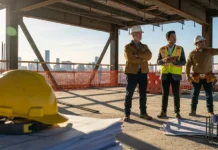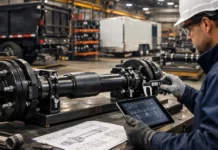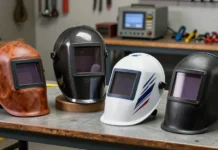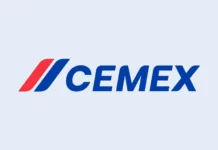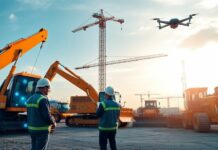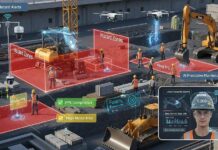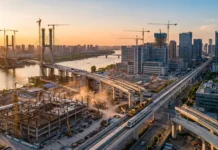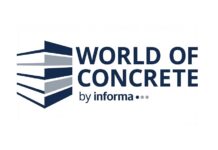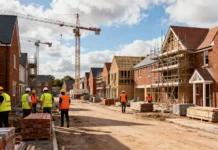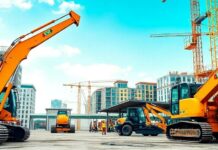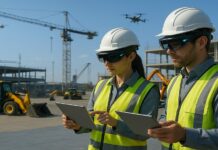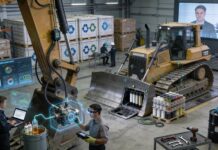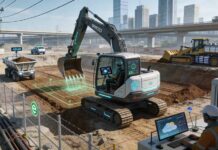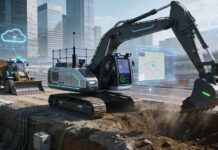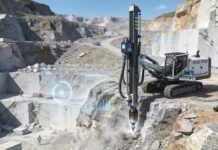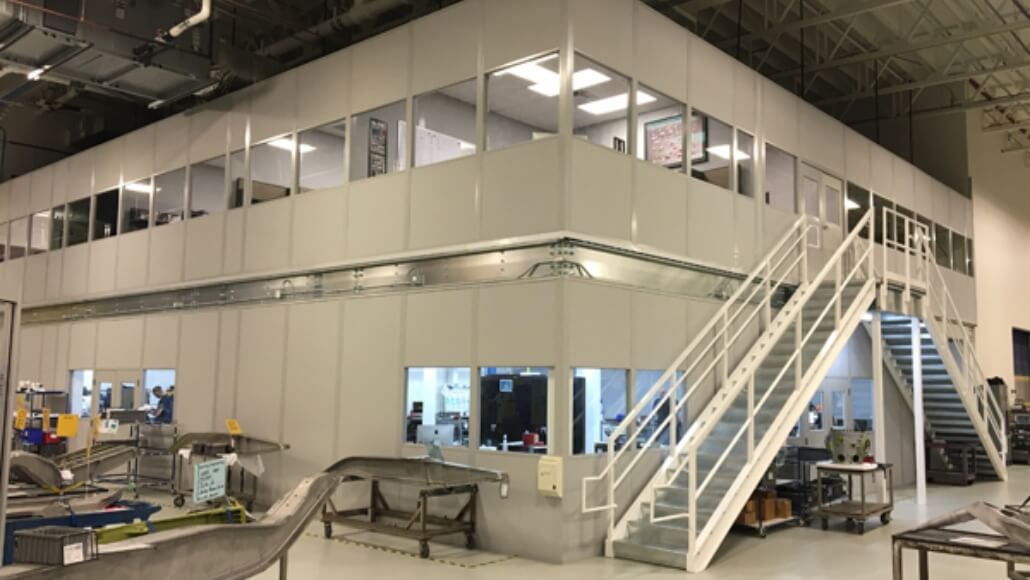Modular construction is revolutionizing how organizations approach space, providing versatile and efficient solutions for a wide range of industries. For site managers, project leaders and decision-makers, choosing the right modular building manufacturer is crucial to success.
Discover how to navigate this process, why the sector is growing in strength and what six leading portable building manufacturers have to offer.
1.STARRCO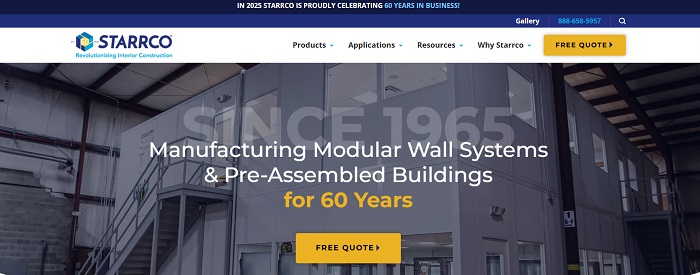
Starrco delivers precision-engineered modular building systems designed for rapid deployment and long-term adaptability. Its solutions are ideal for manufacturers, warehouses and cleanroom environments where downtime and disruption must be minimized. Applications include offices, grow rooms, ticket booths, break rooms and research facilities. All walls and enclosures are fully customizable, allowing clients to scale or reconfigure as needs evolve.
Starrco’s in-house design and project management teams ensure seamless integration with existing operations. The company uses high-quality, prefinished materials to guarantee durability and a professional appearance. With a commitment to fast lead times and minimal on-site construction, Starrco stands out as the best portable building manufacturer for organizations requiring efficiency and versatility.
Key features:
| Pre-engineered systems for fast, clean installation | Modular cleanrooms meeting ISO standards |
| Minimal disruption to ongoing operations | Scalable and relocatable building solutions |
2. Mobile Modular
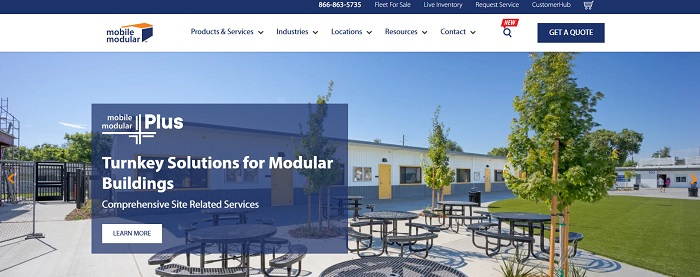 Mobile Modular specializes in providing temporary and permanent buildings with a focus on speed and flexibility. Its extensive rental fleet and nationwide logistics network make the company a go-to for those needing quick turnaround on offices, classrooms or specialty spaces. Its solutions are particularly valuable for disaster recovery scenarios where immediate space is critical.
Mobile Modular specializes in providing temporary and permanent buildings with a focus on speed and flexibility. Its extensive rental fleet and nationwide logistics network make the company a go-to for those needing quick turnaround on offices, classrooms or specialty spaces. Its solutions are particularly valuable for disaster recovery scenarios where immediate space is critical.
Mobile Modular’s team offers site planning, delivery and installation, ensuring a hassle-free experience. With a strong emphasis on customer service and adaptability, the company also offers turnkey furniture and sanitation solutions to complete clients’ projects.
Key features:
| Large inventory for immediate deployment | Flexible rental and purchase options |
| Turnkey site services, including planning and setup | Customizable interiors for diverse applications |
3. Modular Genius
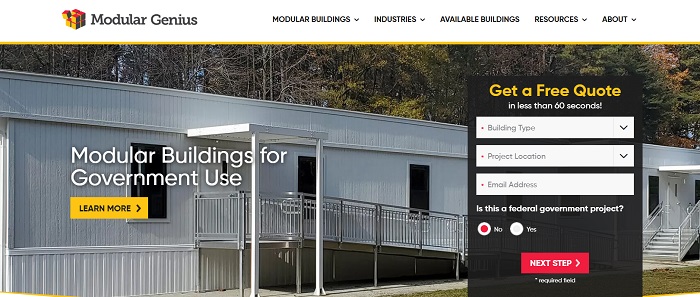 Modular Genius is recognized for its innovative, sustainable prefabricated buildings, serving clients who prioritize green construction and energy efficiency. Its award-winning team delivers modular classrooms, offices and specialty facilities that meet LEED and other environmental standards. The company leverages advanced design technology to create versatile, cost-effective solutions that can be rapidly deployed and easily expanded.
Modular Genius is recognized for its innovative, sustainable prefabricated buildings, serving clients who prioritize green construction and energy efficiency. Its award-winning team delivers modular classrooms, offices and specialty facilities that meet LEED and other environmental standards. The company leverages advanced design technology to create versatile, cost-effective solutions that can be rapidly deployed and easily expanded.
The focus on sustainability and modern aesthetics makes Modular Genius a good choice for schools, government agencies and businesses seeking future-ready spaces.
Key features:
| LEED-certified and green building options | Advanced 3D design and visualization tools |
| Rapid project turnaround with minimal waste | Award-winning innovation |
4. Panel Built
 Panel Built offers a diverse range of portable offices, mezzanines and security booths with both panelized and welded steel construction options. Its solutions are engineered for industrial environments, where strength, versatility and safety are paramount. Preowned structures are also available for immediate delivery.
Panel Built offers a diverse range of portable offices, mezzanines and security booths with both panelized and welded steel construction options. Its solutions are engineered for industrial environments, where strength, versatility and safety are paramount. Preowned structures are also available for immediate delivery.
Panel Built provides 3D video rendering during the project proposal stage, and its modular systems can be integrated with minimum disruption. The firm’s ability to provide custom, heavy-duty structures makes it a strong choice for manufacturing plants, warehouses and security-sensitive sites.
Key features:
| Panelized and welded steel construction options | 3D video rendering |
| Custom mezzanines for space optimization | Security booths with ballistic-rated protection available |
5. BOXX Modular
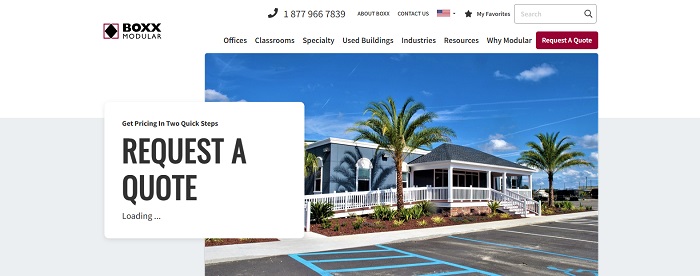 BOXX Modular delivers buildings tailored to commercial, industrial and educational clients, with a strong emphasis on customer service and flexible leasing. Its solutions range from portable offices to workforce housing, all designed for rapid deployment and easy reconfiguration. Industries served include banking and financial, corrections, health care and education.
BOXX Modular delivers buildings tailored to commercial, industrial and educational clients, with a strong emphasis on customer service and flexible leasing. Its solutions range from portable offices to workforce housing, all designed for rapid deployment and easy reconfiguration. Industries served include banking and financial, corrections, health care and education.
The company’s consultative approach ensures each project meets the client’s budgetary and operational needs. Diverse lease or purchase options make BOXX a popular contender for organizations with fluctuating space requirements or those seeking to minimize capital expenditure.
Key features:
| Flexible lease, rent and purchase plans | Workforce housing and specialty units |
| Dedicated project consultants | Rapid response for urgent space needs |
6. Triumph Modular
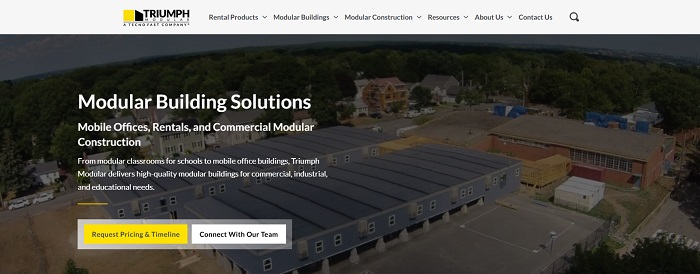 Triumph Modular delivers high-quality prefabricated solutions for commercial, educational and industrial clients across the Northeast, Mid-Atlantic and Upper Midwest. It offers both temporary and permanent buildings, including mobile offices, classrooms, clear span structures and storage containers.
Triumph Modular delivers high-quality prefabricated solutions for commercial, educational and industrial clients across the Northeast, Mid-Atlantic and Upper Midwest. It offers both temporary and permanent buildings, including mobile offices, classrooms, clear span structures and storage containers.
Triumph Modular is known for its turnkey project management, from site preparation to final installation, ensuring builds are completed on time and to code. Its streamlined co-operative purchasing options and responsive customer service make it a trusted partner for organizations needing fast, reliable and code-compliant space.
Key features:
| Full-service project management | Flexible rental, lease and purchase options |
| Regional expertise in local codes and climates | Cooperative purchasing contracts for simplified procurement |
Comparing the Best Portable Building Manufacturers
The top manufacturers were selected from a shortlist of companies with a strong track record and recognition within the construction sector. Firms with a proven history of successful projects were preferred, as were those offering a comprehensive suite of solutions and customization options. Customer service was also considered, including client guidance, after-sales support and streamlined procurement processes. Only those who demonstrated clear adherence to industry standards, building codes and safety regulations were included.
| Company | Founded | Key Services | Unique Value/Focus | Geographic Reach |
| Starrco | 1965 | Modular offices, cleanrooms, booths, grow rooms | Precision, speed, customization | Nationwide |
| Mobile Modular | 1979 | Offices, classrooms, storage | Large rental inventory | U.S. and Caribbean |
| Modular Genius | 2006 | Offices, classrooms, clinics, booths | Sustainability, innovation | Nationwide |
| Panel Built | 1995 | Offices, cleanrooms, lactation rooms, security booths | Panelized and welded options | Nationwide |
| BOXX Modular | 1998 | Offices, classrooms, labs, restrooms, banks | Flexible leasing | East Coast and the Sun Belt |
| Triumph Modular | 1981 | Offices, classrooms, storage | Regional expertise, cooperative purchasing | Northeast, Mid-Atlantic, Midwest |
What to Consider When Choosing a Modular Building Company
Key things to address include:
- Company experience and completed project portfolio.
- Customization capabilities and design support.
- Lead times, logistics and installation process.
- Compliance with industry standards and certification.
- After-sales support and warranty.
- References and case studies.
What to Expect From the Modular Building Process
Understanding the process helps ensure a smooth project from concept to completion. While each portable building manufacturer may have its own workflow, most prefabricated construction projects follow the same key stages.
1. Initial Consultation and Needs Assessment
The provider and client meet to establish space requirements, intended use, site conditions, timeline and budget. This stage is crucial for aligning expectations and identifying the best modular solution.
2. Design and Engineering
The provider’s design and engineering teams develop detailed plans. The client reviews floor plans, elevations and specifications, with opportunities to customize layouts, finishes and features. The provider ensures all designs comply with local building codes and regulations. This phase may also include 3D modeling or virtual walkthroughs.
3. Permitting and Approvals
The modular company typically assists with securing necessary permits and approvals from local authorities. Portable buildings must meet the same codes as traditional structures, so this step is crucial for ensuring compliance and a smooth progression.
4. Offsite Fabrication
With approvals in place, modules are constructed in a controlled factory environment. This allows for consistent quality, efficient material use and protection from weather delays.
5. Site Preparation
This happens simultaneously with fabrication. While modules are being built, the site is readied for delivery. This includes foundation installation, utility hookups and ensuring access for delivery vehicles. Good coordination at this stage minimizes downtime and keeps the project on schedule.
6. Delivery and Installation
Completed modules are transported to the site, often within a single day or across a few days for larger projects. Cranes or specialized equipment position the modules on the foundation. The provider’s crew then connects the modules, seals joints and integrates systems such as HVAC, electrical and plumbing.
7. Final Finishing and Commissioning
After installation, finishing touches are completed — this may include interior trim, flooring, painting and exterior cladding. The portable building manufacturer conducts thorough inspections and testing to ensure all systems function as intended. Any punch-list items are addressed before handover.
8. Handover and Occupancy
Once the building passes final inspections, it’s ready for occupancy. The provider may offer a walk-through, user training and documentation for maintenance and warranties. Ongoing support or service agreements may also be available.
Understanding the Pros and Cons of Modular Building
The modular building industry is expanding rapidly — perhaps not surprisingly, given that this method is typically up to twice as fast and 20% cheaper than traditional construction.
| Factor | Modular Construction | Traditional Construction |
| Speed of delivery | 30–50% faster
Off-site fabrication allows site work and building assembly to occur simultaneously |
Slower
Sequential process
Weather delays common |
| Cost predictability | High
Fixed pricing
Fewer change orders |
Variable
More prone to overruns and delays |
| Quality control | Consistent
Factory-controlled environment |
Variable
Dependent on site conditions and labor |
| Disruption to site | Minimal
Less dust, noise and traffic |
High
Ongoing activity for months |
| Flexibility | High
Easy to expand, relocate or reconfigure |
Low
Changes are costly and time-consuming |
| Sustainability | Less waste
More efficient material use |
More waste
Harder to control material use |
| Labor requirements | Fewer on-site workers
Safer conditions |
More on-site labor
Higher safety risks |
| Weather dependency | Low
Most work is done indoors |
High
Weather can cause significant delays |
| Customization | Increasingly customizable, but some design limits | Fully custom, but at a higher cost and time |
| Regulatory approval | Must meet the same codes
Some areas require extra documentation |
Well-understood by local authorities |
Modular construction offers many advantages. However, it does require a heavier up-front planning and coordination burden, and there can be transportation and site access challenges at some locations. There is also a perception lag, with prefabricated buildings still being seen as of lesser quality in some marketplaces or sectors.
Key Sustainability Benefits of Modular Construction
Sustainability is one area where modular builds can truly shine. It has an edge here for several reasons.
1. Reduced Material Waste
Factory-controlled processes optimize material use, with offcuts and surplus materials often recycled or reused. Some studies have shown that prefabricated projects can reduce construction waste by up to 90% compared with traditional methods.
2. Lower Carbon Footprint
Shorter timelines lead to reduced energy consumption. Modular sites typically require fewer deliveries and less heavy equipment, which reduces emissions. In many cases, off-site manufacturing processes can be powered by renewable energy sources.
3. Improved Energy Efficiency
The best portable building manufacturers often design to include high-performance insulation, windows and HVAC systems. Meanwhile, precision engineering ensures tighter building envelopes, reducing heating and cooling needs.
4. Reusability and Adaptability
Because portable units can be relocated, repurposed or reconfigured, they can be used multiple times throughout their lifetime. This extends the life cycle and reduces the need for new construction. At end-of-life, modules can be disassembled and recycled, minimizing landfill impact.
5. Easier Green Certification
Modular projects can more easily achieve LEED, WELL or other green construction certifications, due to their controlled processes and documentation. Many portable building manufacturers offer eco-friendly materials and finishes as standard options.
Frequently Asked Questions About Portable Buildings
The following are commonly asked questions.
Q: How long does it take to install a modular building?
A: It’s typically much faster than traditional construction. Once site preparation is complete and modules are delivered, installation can often be completed in a matter of days. The overall project timeline is greatly reduced due to the ability to perform site work and building manufacturing simultaneously.
Q: Are portable buildings as durable as traditional structures?
A: Yes, they are engineered to meet the same structural standards and codes as traditionally-built structures. They are constructed using high-quality materials in controlled factory environments, resulting in consistent standards and durability. With proper maintenance, portable buildings can offer long-term performance comparable to that of conventional construction.
Q: Can modular buildings be expanded or relocated?
A: This is a key advantage of the modular method. Units are designed to be easily expanded, reconfigured or relocated as needs change. This is what makes them ideal for organizations with evolving requirements.
Q: What are the financing or leasing options?
A: Most portable building manufacturers offer a range of financing solutions, including outright purchase, operating leases and short- or long-term rentals. Leasing and rental options are particularly attractive for temporary space needs or projects with limited capital budgets, while purchasing may be more suitable for permanent installations.
Q: How do prefabricated buildings meet local building codes?
A: Providers work closely with regulatory authorities to ensure that each project meets or exceeds code requirements. Modules are inspected both at the factory and on-site, and the completed building undergoes the same approval process as traditional construction.
Building Smarter With Modular Solutions
Choosing the best portable building manufacturer is a strategic decision that can deliver lasting value, efficiency and adaptability for any organization. By understanding the strengths of leading manufacturers and the benefits of modular construction, industry professionals are well-equipped to make informed choices.
As the portable building sector continues to innovate and expand, it looks increasingly poised to offer promising solutions to today’s space and building challenges.



